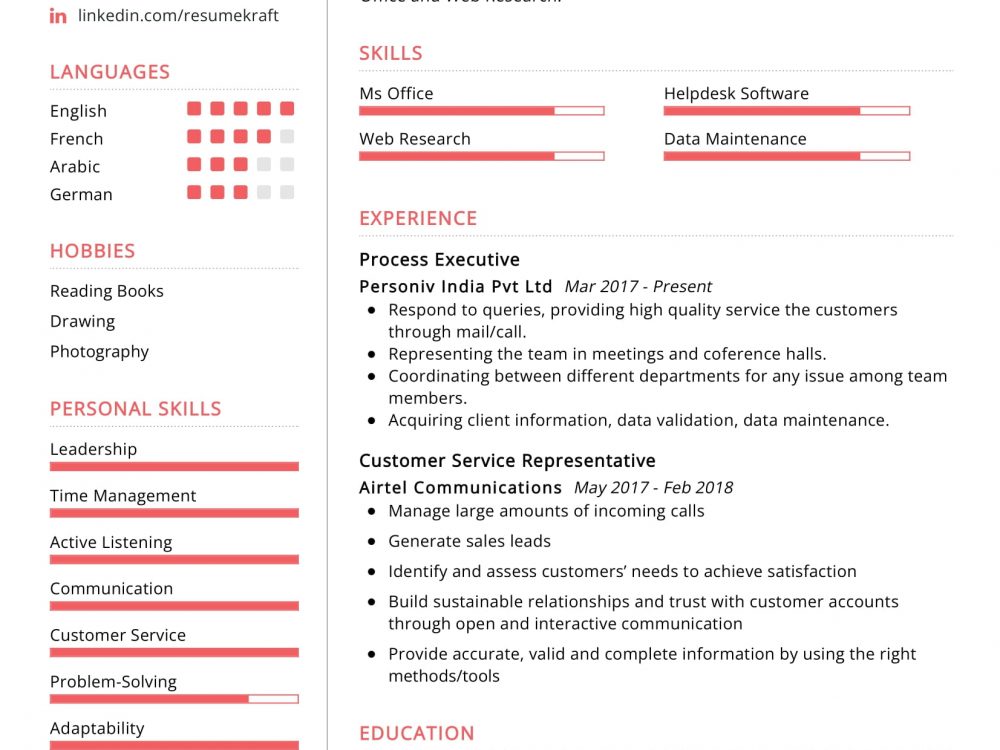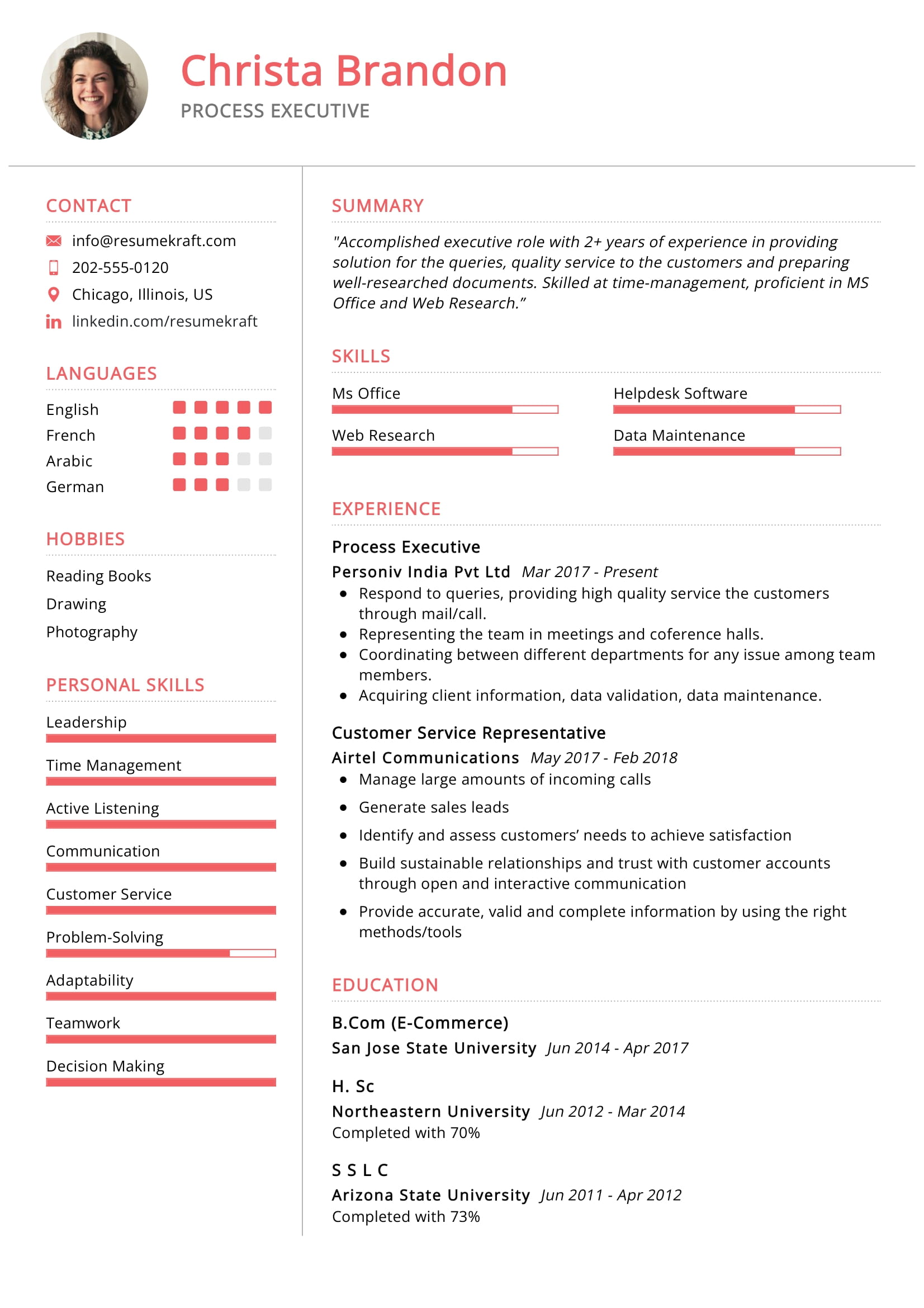What Should Be Included In A Process Executive Resume?
Every job search should start with an updated and effective resume. As a process executive, your resume should clearly demonstrate the skills and expertise you bring to the hiring process. Your resume should also be tailored to fit the specific requirements of the job you are applying for.
The first section of your resume should contain a summary of your qualifications and relevant experience. This should include a brief narrative that outlines your professional background as well as your qualifications and accomplishments. You can also include a list of certifications or training courses that you have completed that are relevant to the position.
Next, your resume should include a section for your work history. This should include a detailed list of your professional experience and the positions you held in each job. Be sure to highlight any accomplishments or successes you achieved during your tenure.
Your resume should also include a section for any relevant education or qualifications you possess. This should include any college degrees, coursework, or certifications that you possess. Again, highlight any unique accomplishments or awards that you have earned in your educational pursuits.
Finally, you should include a section for any volunteer work or extracurricular activities that you have been involved in. This can be a great way to demonstrate your commitment to the industry and your willingness to go the extra mile.
By ensuring that your resume contains these key elements, you will give yourself the best chance of success in the hiring process. A well-crafted resume will help employers to quickly identify your qualifications and immediately distinguish you from other applicants.
What Skills Should I Put On My Resume For Process Executive?
When it comes to a Process Executive resume, there are certain skills you should consider including to highlight your qualifications and experience. Process Executives are responsible for overseeing all aspects of their organization’s operations and processes, from strategy and implementation to monitoring and assessment. It is important to include the skills that demonstrate your ability to lead, manage, and optimize processes and operations.
When creating your Process Executive resume, make sure to include skills that demonstrate your knowledge and experience in process development, improvement, and optimization. This includes the ability to analyze current processes to identify areas of improvement, develop strategies to improve efficiency and effectiveness, and implement those strategies. Additionally, you should be able to create and manage systems of processes and procedures, as well as track and report progress.
You should also emphasize process-oriented skills such as data analysis, forecasting, and budgeting. These skills demonstrate your ability to measure the impact of process improvements, track progress and performance, and create plans to optimize operations. Finally, include soft skills such as communication, organizational skills, and critical thinking. These skills will help you effectively communicate with stakeholders, manage team dynamics, and make informed decisions.
By showcasing these skills on your Process Executive resume, you will be able to demonstrate your experience and qualifications and land the job.
What Is The Job Description Of The Process Executive?
The Process Executive is a crucial role within any organization, responsible for overseeing the successful completion of all business processes. The job of a Process Executive is to ensure that all processes are up-to-date and efficient, as well as implementing new and improved processes to increase productivity and profitability.
The Process Executive is responsible for a wide range of tasks, from identifying and defining processes to monitoring their progress and analyzing their effectiveness. They must also develop and document process improvement initiatives, and implement quality assurance measures to ensure high standards of process execution. Additionally, the Process Executive must be able to identify and address inefficiencies in existing processes and propose changes to increase efficiency.
The Process Executive must possess a thorough understanding of organizational structures, process engineering, and project management principles. They must also have exemplary communication and problem-solving skills, as well as the ability to effectively manage multiple projects simultaneously. Process Executives must also be knowledgeable in various areas of computing, including databases, software development, and business logic.
The Process Executive role requires sound judgment, strong organizational skills, and the ability to work in a highly collaborative environment. It is critical that the Process Executive understand how processes work, how they interact with other processes, and how they impact the overall organization. The Process Executive must have the ability to think critically and make decisions quickly, as well as the ability to adapt quickly to changing requirements.
The Process Executive is an essential role for any organization, and those who excel in this position are highly sought after. If you have the skills and experience required for the role, it can be an exciting and rewarding career.
What Is A Good Objective For A Process Executive Resume?
When it comes to crafting the perfect resume for a Process Executive, the objective statement is an important part of the document. The objective statement should be tailored to the position and should reflect the applicant’s professional goals. An effective objective statement should be clear, succinct, and demonstrate how the applicant can add value to the organization.
A good objective for a Process Executive resume should highlight the applicant’s ability to streamline operations, manage projects, and lead teams. It should also emphasize the applicant’s commitment to excellence, attention to detail, and ability to work in a fast-paced environment. Additionally, the applicant should demonstrate their ability to think strategically and create innovative solutions to complex problems.
Ultimately, a good objective statement should provide the hiring manager with a clear understanding of the applicant’s goals and how they can help the organization reach its objectives. It should be tailored specifically to the position and demonstrate the applicant’s experience, qualifications, and commitment to the role. By crafting an effective objective statement, the applicant can make a positive impression on the hiring manager and increase their chances of getting the job.
What Are 5 Responsibilities Of A Process Executive?
A process executive is an important role in any organization. They are responsible for overseeing the day-to-day operations and processes that keep the business running smoothly. They are also responsible for ensuring that the company meets its operational goals and standards. In order to be successful in this role, process executives must have a strong understanding of the organization’s processes and be able to effectively manage the various tasks that come with the job. Here are five of the most important responsibilities of a process executive.
- Analyzing Processes: Process executives must have strong analytical skills in order to identify potential areas of improvement within the organization’s processes. They need to be able to identify areas that can be streamlined or automated to increase efficiency.
- Developing Processes: Process executives need to be able to develop new processes and make improvements to existing ones. This involves designing the process and ensuring that it meets the organization’s operational goals and standards.
- Implementing Processes: Once a process is designed, it needs to be implemented. This involves developing detailed plans and gathering the resources needed to implement the process. It also involves training staff on how to use the process and monitoring the results.
- Measuring Results: Process executives need to be able to measure the effectiveness of a process. They should be able to compare the performance of different processes, track progress over time, and identify areas that need improvement.
- Documenting Processes : Process executives must also document processes clearly enough that they can be used by other staff members and stakeholders. This includes writing detailed descriptions of each step of the process and recording the resources needed to complete it. It also involves creating diagrams and flowcharts that illustrate how the process works.
What Are The Career Prospects In The Process Executive?
The career prospects for a Process Executive are quite promising. As a Process Executive, you will be responsible for managing and executing processes to ensure that the company runs efficiently and effectively. You will be required to analyze process flows and create strategies to improve them. You will also be responsible for coordinating activities between different departments and ensuring that tasks are completed in a timely manner. Additionally, you will need to monitor the performance of each process and identify areas for improvement.
Being a Process Executive requires great problem-solving and communication skills. You will need to be able to work independently and work with a variety of teams and departments. You will also need to be able to manage multiple projects at once, and ensure that deadlines are met.
If you have the necessary skills and qualifications, you can expect to earn a competitive salary. You should also be able to find opportunities to advance within the organization or move up to higher-level positions in the future. With the right experience and qualifications, you can find a range of job opportunities in the process executive field. Additionally, you may be able to move into a management or leadership role within the company.
Executive resumes are typically seen as the most important documents in your job search. They provide a concise and professional snapshot of your qualifications and career history. To make sure you create the right impression, it’s essential to understand the best practices for crafting an executive resume.
When writing an executive resume, you should always put your most pertinent and impressive qualifications first. Your contact information, professional summary, and experience sections should be easy to find and feature your most impressive accomplishments. This will help you stand out from other applicants and draw the attention of potential employers.
In the experience section, start with your current or most recent job and list positions in reverse chronological order. Include the title of each role, the employer’s name, and the dates of your employment. Then, focus on your accomplishments and any duties that are relevant to the job you’re applying for.
Finally, make sure to proofread your resume multiple times. Check for grammar and punctuation mistakes, and review the format to make sure everything is consistent. Your executive resume should be a testament to your professionalism, so taking the extra time to make sure everything is perfect can make a huge difference.


